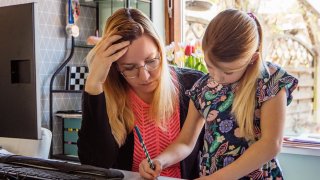
Aylah Levy had some catching up to do this fall when she started first grade.
After spending her kindergarten year at an alternative program that met exclusively outdoors, Aylah, 6, had to adjust to being inside a classroom. She knew only a handful of numbers and was not printing her letters clearly. To help her along, the teacher at her Bay Area elementary school has been showing her the right way to hold a pencil.
“It’s harder. Way, way harder,” Aylah said of the new grip.
Still, her mother, Hannah Levy, says it was the right decision to skip kindergarten. She wanted Aylah to enjoy being a kid. There is plenty of time, she reasoned, for her daughter to develop study skills.
Get a weekly recap of the latest San Francisco Bay Area housing news. Sign up for NBC Bay Area’s Housing Deconstructed newsletter.
The number of kindergartners in public school plunged during the COVID-19 pandemic. Concerned about the virus or wanting to avoid online school, hundreds of thousands of families delayed the start of school for their young children. Most have returned to schooling of some kind, but even three years after the pandemic school closures, kindergarten enrollment has continued to lag.
Some parents like Levy don't see much value in traditional kindergarten. For others, it's a matter of keeping children in other child care arrangements that better fit their lifestyles. And for many, kindergarten simply is no longer the assumed first step in a child's formal education, another sign of the way the pandemic and online learning upended the U.S. school system.
U.S. & World
Kindergarten is considered a crucial year for children to learn to follow directions, regulate behavior and get accustomed to learning. Missing that year of school can put kids at a disadvantage, especially those from low-income families and families whose first language is not English, said Deborah Stipek, a former dean of the Graduate School of Education at Stanford University. Those children are sometimes behind in recognizing letters and counting to 10 even before starting school, she said.
But to some parents, that foundation seems less urgent post-pandemic. For many, kindergarten just doesn't seem to work for their lives.
Students who disengaged during the pandemic school closures have been making their way back to schools. But kindergarten enrollment remained down 5.2% in the 2022-2023 school year compared with the 2019-2020 school year, according to an Associated Press analysis of state-level data. Public school enrollment across all grades fell 2.2%.
Kindergarten means a seismic change in some families' lifestyles. After years of all-day child care, they suddenly must manage afternoon pickups with limited and expensive options for after-school care. Some worry their child isn't ready for the structure and behavioral expectations of a public school classroom. And many think whatever their child misses at school can be quickly learned in first grade.
Christina Engram was set to send her daughter Nevaeh to kindergarten this fall at her neighborhood school in Oakland, until she learned her daughter would not have a spot in the after-school program there. That meant she would need to be picked up at 2:30 most afternoons.
“If I put her in public school, I would have to cut my hours, and I basically wouldn’t have a good income for me and my kids,” said Engram, a preschool teacher and a mother of two.
Engram decided to keep Nevaeh in a child care center for another year. Engram receives a state child care subsidy that helps her pay for full-time child care or preschool until her child is 6 and must enroll in first grade.
Compared with kindergarten, she believed her daughter would be more likely to receive extra attention at the child care center, which has more adult staff per child.
“She knows her numbers. She knows her ABCs. She knows how to spell her name,” Engram said. “But when she feels frustrated that she can’t do something, her frustration overtakes her. She needs extra attention and care. She has some shyness about her when she thinks she’s going to give the wrong answer.”
In California, where kindergarten is not mandatory, enrollment for that grade fell 10.1% from the 2019-20 to 2021-22 school year. Enrollment seemed to rebound partially in the next school year, growing by over 5% in fall 2022, but that may have been inflated by the state’s expansion of transitional kindergarten — a grade before kindergarten that is available to older 4-year-olds. The state Department of Education has not disclosed how many children last school year were regular kindergartners as opposed to transitional students.
Many would-be kindergartners are among the tens of thousands of families that have turned to homeschooling.
Some parents say they came to homeschooling almost accidentally. Convinced their family wasn't ready for “school,” they kept their 5-year-old home, then found they needed more structure. They purchased some activities or a curriculum — and homeschooling stuck.
Others chose homeschooling for kindergartners after watching older children in traditional school. Jenny Almazan is homeschooling Ezra, 6, after pulling his sister Emma, 9, from a school in Chino, California.
“She would rush home from school, eat dinner, do an hour or two of schoolwork, shower and go to bed. She wasn’t given time to be a kid,” Almazan said. Almazan also worried about school shootings and pressures her kids might face at school to act or dress a certain way.
To make it all work, Almazan quit her job as a preschool teacher. Most days, the children's learning happens outside of the home, when they are playing at the park, visiting museums or even doing math while grocery shopping.
“My kids are not missing anything by not being in public school,” she said. “Every child has different needs. I’m not saying public school is bad. It’s not. But for us, this fits.”
Kindergarten is important for all children, but especially those who do not attend preschool or who haven't had much exposure to math, reading and other subjects, said Steve Barnett, co-director for the National Institute for Early Education Research and a professor at Rutgers University.
“The question actually is: If you didn’t go to kindergarten, what did you do instead?" he said.
Hannah Levy chose the Berkeley Forest School to start her daughter's education, in part because she valued how teachers infused subjects like science with lessons on nature. She pictured traditional kindergarten as a place where children sit inside at desks, do worksheets and have few play-based experiences.
“I learned about nature. We learned in a different way," daughter Aylah said.
But the appeal of a suburban school system had brought the family from San Francisco, and when it came time for first grade, Aylah enrolled at Cornell Elementary in Albany.
Early this fall, Levy recalled Aylah coming home with a project where every first grader had a page in a book to write about who they were. Some pages had only scribbles and others had legible print. She said Aylah fell somewhere in the middle.
“It was interesting to me because it was the moment I thought, ‘What would it be like if she was in kindergarten?’” she said.
In a conference with Levy, Aylah's teacher said she was working with the girl on her writing, but there were no other concerns. "She said anything Aylah was behind on, she has caught up to the point that she would never differentiate that Aylah didn’t go to Cornell for kindergarten as well,” Levy said.
Levy said she feels good about Aylah's attitude toward school, though she misses knowing she was outside interacting with nature.
So does Aylah.
“I miss my friends and being outside,” she said. “I also miss my favorite teacher.”
___
Lurye reported from New Orleans and Stavely reported from Oakland. Daniel J. Willis of EdSource contributed from Concord.



